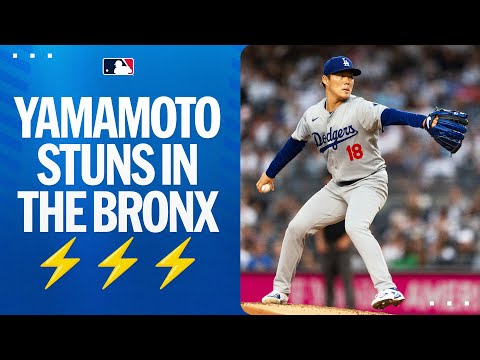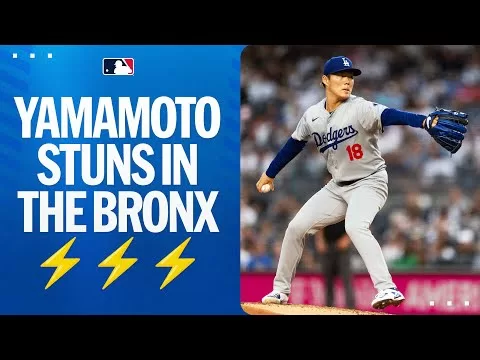Not in the Dodgers’ pregame clubhouse, when Yamamoto sat alone at his locker, then with his legs propped up on a black leather couch, quietly reviewing scouting reports as a gaggle of reporters swarmed the otherwise empty room around him.
Not as he took the field hours later at Yankee Stadium, in the opening game of this weekend’s highly anticipated Dodgers-Yankees series, receiving a chorus of boos from a fan base that had hoped to see him in pinstripes this season.
And certainly not over a scoreless seven-inning, seven-strikeout start in the Dodgers’ 2-1 extra-innings win, with Yamamoto’s gem eventually setting up Teoscar Hernández for a game-deciding two-run double in the 11th inning.
Indeed, in a high-profile series billed as being all about the stars, it was Yamamoto who shined brightest Friday night.
In the build-up to this week’s series in the Bronx — a showdown between not only two of MLB’s most historic franchises, but two first-place teams on track for World Series contention — most of the attention surrounded the litany of former MVPs and perennial All-Stars on the field.
Shohei Ohtani, Mookie Betts and Freddie Freeman for the Dodgers. Aaron Judge, Giancarlo Stanton and Juan Soto for New York.
“I’m excited to see the stars show out,” Dodgers manager Dave Roberts said before the game. “We have some of the best players on the planet playing here.”
Where exactly Yamamoto fit into that celebrity constellation was less clear.
The 25-year-old Japanese right-hander did earn the biggest contract for a pitcher (excluding Ohtani) this offseason, signing with the Dodgers — despite heavy interest from several other big-market clubs, the Yankees chief among them — on a 12-year, $325-million deal.

He did come to MLB as one of the most decorated pitchers in the history of Japan’s Nippon Professional Baseball, winning that league’s equivalent of the Cy Young Award three times while dazzling scouts and executives on the other side of the Pacific.
Still, entering Friday, Yamamoto had authored few signature moments in his rookie season.
His ERA was 3.32, solid but still outside the top 35 in the majors. He’d yet to face an offense anywhere near as potent as New York’s, even with Soto out of the lineup Friday (and questionable for the rest of the series with a forearm injury). And on a Dodgers team that needs him to pitch like an ace at the top of their rotation, his tantalizing talent had largely come in temporary flashes — and on stages much smaller than Friday’s sellout crowd at Yankee Stadium.
“It’s going to be a good test for him,” Roberts said. “But I know, for sure, the moment, the stage won’t be too big.”
Such intuition was spot on.
Before the game, as the rest of his teammates emptied out of a clubhouse teeming with more than two dozen reporters, Yamamoto stayed put. Hat backward. Headphones on. Seemingly in his own world.
Dodgers teammates (from left) Jason Heyward, Teoscar Hernández and Andy Pages celebrate after a 2-1 win over the New York Yankees at Yankee Stadium on Friday.
(Frank Franklin II / Associated Press)
“He’s pitched in a lot of big games in his career,” Roberts said, referring to Yamamoto’s Japanese career and World Baseball Classic championship with Japan last year. “This is just going to be another experience for him.”
Once he took the mound, however, Yamamoto didn’t pitch like it was just another game.
From the jump, the undersized right-hander found increased velocity in his fastball, throwing 29 pitches 97 mph or harder (plus another six at 96.9 mph) after eclipsing that mark only three times previously all year. Yamamoto’s execution of the splitter and slider was also more consistent, using the two pitches to complete four of his strikeouts.
The Yankees — who entered the night with an eight-game winning streak and the best record in the majors — did stress Yamamoto early. Aaron Judge hit a double in the first. Two runners reached in the second on a Kiké Hernández error and a Trent Grisham single.
But after escaping both of those jams — on a pair of wipeout sliders for inning-ending strikeouts — Yamamoto cruised the rest of the way. He didn’t allow another hit. He retired 15 of the last 17 batters he faced. In the final two innings of his career-high 106-pitch outing, he worked around his only two walks of the game, as well, fanning Stanton with an elevated fastball to end the sixth before inducing a double-play grounder from DJ LeMahieu with his final pitch.
The game remained scoreless long after Yamamoto left the mound.
The Yankees stranded the bases loaded in the eighth. Both teams failed to score their automatic extra-inning baserunner in the 10th. And not until Teoscar Hernández found the left-center field gap in the 11th, scoring Ohtani (who went 0 for five) from second base and Freeman (0 for two with two walks) from first, did either team finally manage to get a runner across the plate.
The Yankees got one run back in the 11th inning, when Judge (two for three with two walks) lined an RBI single off Yohan Ramírez — a typically low-leverage reliever asked to save the game for the Dodgers’ worn-out bullpen.
The Yankees, however, mustered nothing else.
That’s why Yamamoto’s outing was so crucial. Why, in a series all about star power, the Japanese pitcher made sure his name was included on the list.
